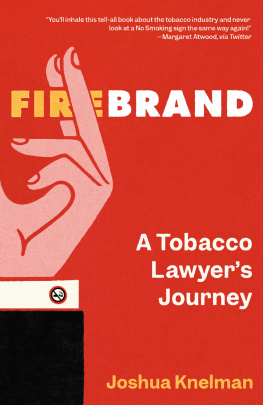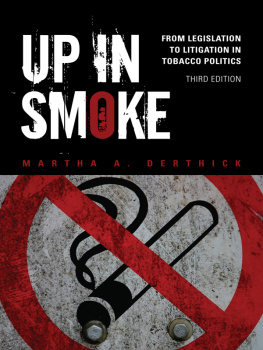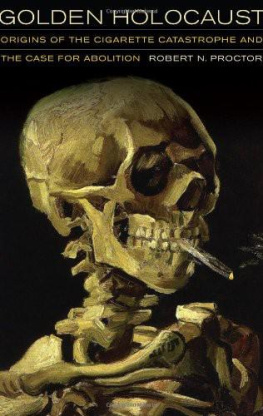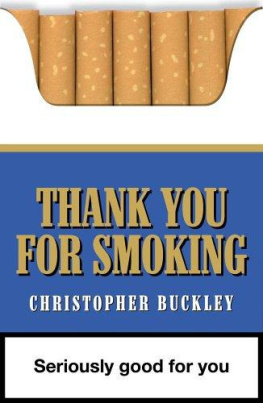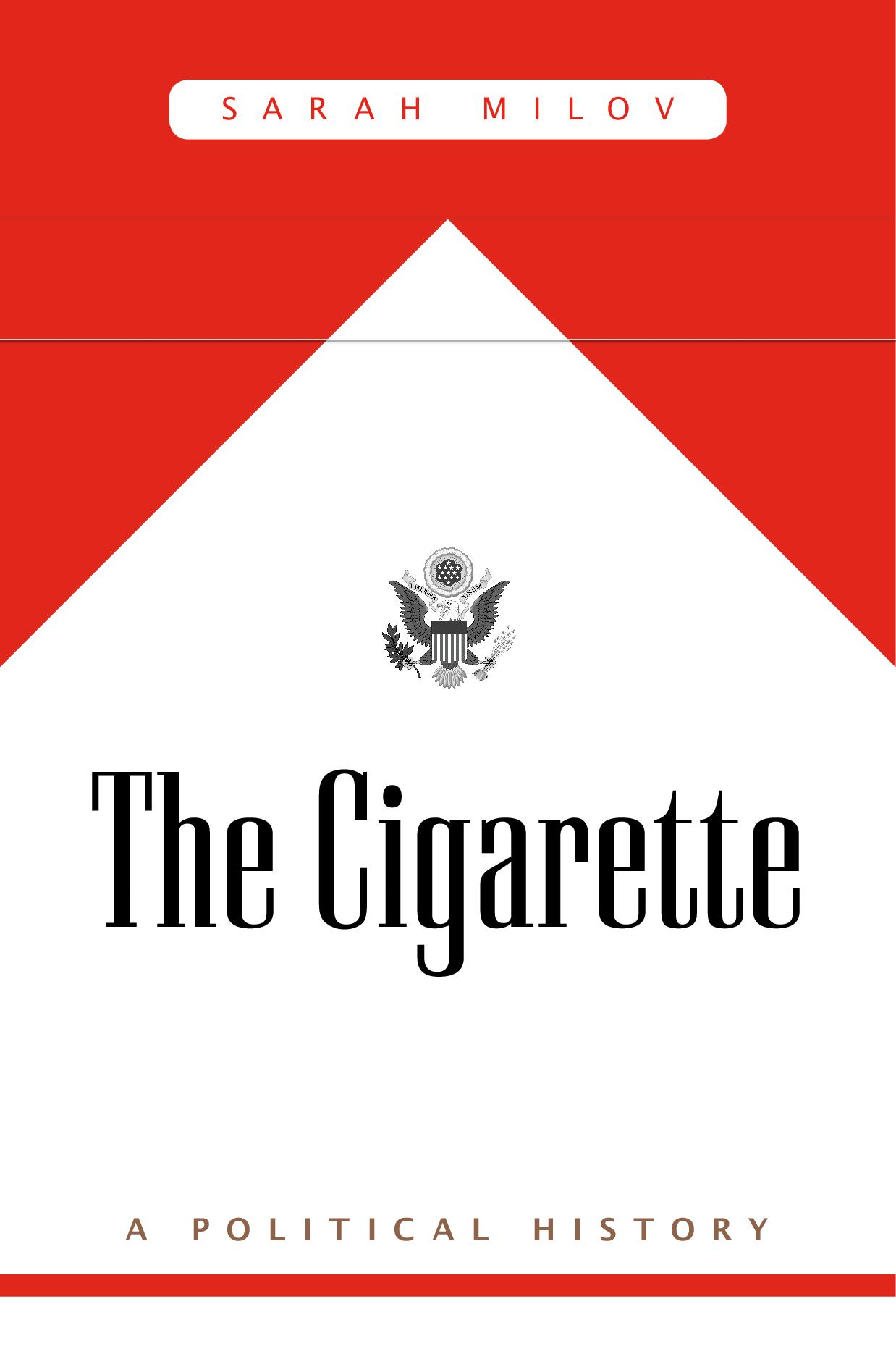978-0-674-24121-3 (alk. paper)
Names: Milov, Sarah, 1984 author.
Title: The cigarette : a political history / Sarah Milov.
Description: Cambridge, Massachusetts : Harvard University Press, 2019. | Includes bibliographical references and index.
Subjects: LCSH: CigarettesUnited StatesHistory20th century. | Tobacco industryUnited StatesHistory20th century. | TobaccoUnited StatesHistory20th century. | SmokingLaw and legislationUnited StatesHistory20th century.
Classification: LCC HD9149.C43 U663 2019 | DDC 338.4/76797309730904dc23 LC record available at https://lccn.loc.gov/2019002275
ON A COLD SATURDAY IN JANUARY 1964, a morning press conference garnered international attention. To the chagrin of some of the assembled journalists, no smoking signs had been hastily affixed to the auditorium walls in advance of the release of the much-anticipated Surgeon Generals Report on Smoking and Health. The auditorium doors were locked and uniformed guards blocked doors leading to other parts of the building. Inside, Luther Terry, John F. Kennedys choice as surgeon general, who was now serving at the pleasure of Lyndon Johnson, and the other members of the committee responsible for the report fielded questions from hundreds of journalists who had just got their hands on it. The nearly 400-page report concluded that cigarettes caused deathdeath from lung cancer, bronchitis, emphysema, and coronary artery disease. After reviewing the accumulated evidence on the relationship between cigarette smoking and disease, two of the committee members had quit smoking altogether. Terry himself had switched from cigarettes to an occasional cigar or pipe. Some of the reporters expressed their anxiety over the governments findings in a rather different wayby sheepishly smoking in the halls.
The theatrics of the reports releasethe lock-and-key treatment, the Saturday morning presserwere intended to minimize the effects upon the stock market. The committee neednt have worried. The Royal College of Physicians had published a similar report two years earlier. But enlightenment alone cannot effect a widespread change in behavior. Laws and institutions must change as well. People must be compelled.
Cigarettes were central to American political institutions throughout the twentieth century. At home and abroad, the U.S. government encouraged people to smoke. And for four decades after the surgeon general determined that cigarette smoking was dangerous, the government continued to subsidize tobacco production. Although the big cigarette firms were among the most powerful American companies by mid-century, tobaccos political privilege lay less in the machinations of industry than in the everyday workings of American government. For a literal representation of the crops importance to American politics, one need look no further than the Capitol buildings grand Hall of Columns, where tobacco leaves sit atop the Corinthian columns, holding the building together.
By the mid-1970s, however, Americans were smoking less. By 1974, the percentage of smoking adults had fallen to 37 percent, and it has continued downward in a sustained descent right through the present day. A transformation in the way that Americans understood and demanded an entitlement to public space catalyzed this change in behavior. Beginning in the 1970s, more and more Americans identified themselves by their rejection of smoking. Drawing inspiration from the civil rights and environmental movements, a group of nonsmoking activists extinguished the public hold of cigarettesachieving their goal of making smoking socially unacceptable. Under the banner of nonsmokers rights, grassroots activists organized and won restrictions on smoking in a variety of public places.
Nonsmokers, a group that had once been, in the words of Richard Nixons surgeon general, Jesse Steinfeld, the true silent majority, began to speak. They found success not in Congresswhich journalist Elizabeth Drew characterized in 1965 as the industrys best filter yetbut in local ordinances and voluntary rules imposed by employers. By 1974, both the Civil Aeronautics Board (CAB) and the Interstate Commerce Commission (ICC) had implemented rules restricting smoking on flights and interstate buses. The history of the cigarette is the history of governments complex machinery, its levers of power differentially accessible to organized business, farmers, and activists.
Smoking, Citizenship, and the State
The movement of tobacco from the center to the periphery of American political life highlights two competing conceptions of government at work during twentieth century: one concerned with the prerogatives and economic rights of producers, the other with the broad social costs of such producerism. For most of the twentieth century, the federal government had an active hand in shoring up the cigarette economy: soldiers rations helped to popularize the cigarette in wartime, surplus export programs boosted farmers incomes and global cigarette consumption, and a generous price support system stabilized the agricultural economy of the Southeast until 2004long after the surgeon general had proclaimed the cigarette lethal.
The political economy of tobacco production and consumption was rooted in a New Dealera vision of supply management. The New Deal ushered in an expansive program of agricultural regulations.
Associationalism is the term that scholars use to describe the achievement of public policy goals through private means.
The premises of tobacco associationalism came under sustained assault by the public interest movement of the 1960s and 1970s. Grassroots activistsled mostly by womenand Washington-based lawyers ushered the arrival of the nonsmoker as a rights-bearing political subject. For these activists, rights were a powerful rhetorical toolladen with moral heft in the wake of the rights revolutions of the 1960s. For nonsmoker activists, dethroning tobacco from its political perch was part and parcel of a quest for broader political representation.
The language of rights also dovetailed with the emergent public interest critique emanating from the environmental and consumer protection movements of the 1960s and 1970s. Public interest reformers were skeptical of the states capacity to reflect more than the narrow economic interests of business. They sought to democratize what they understood as a managerial corporate state, and did so by insisting on greater opportunities for citizen participation in administration:
Like these movements, the nonsmokers rights movement drew attention not only to the negative externalities of modern American lifepollution, industrial poisoning, lung cancer, and heart diseasebut also to the sclerotic decision-making structures that privileged the organized few at the expense of the disorganized many. It sought to embed calls for nonsmokers rights within the broader struggle to make political processes more inclusive. As such, the political history of the cigarette highlights the connections between the politics of the body and those of the body politic.


